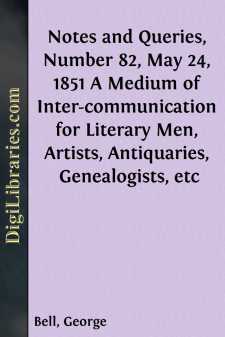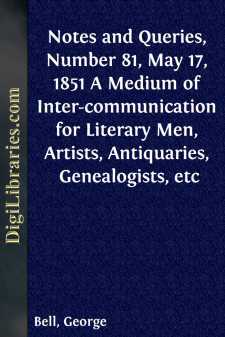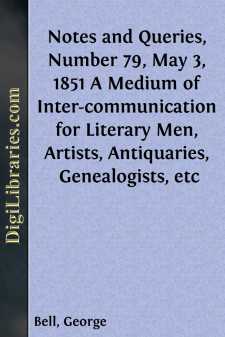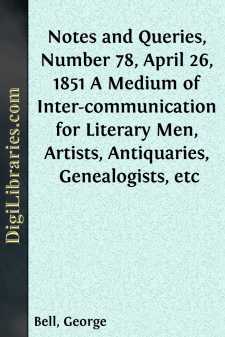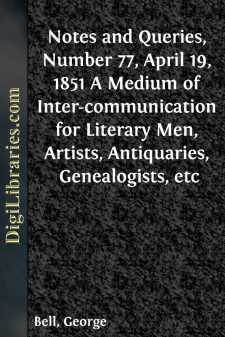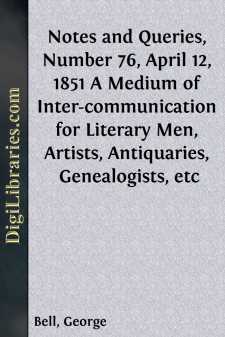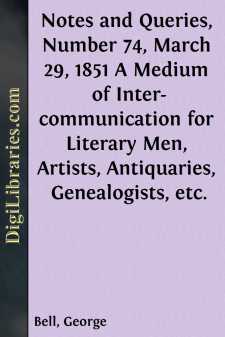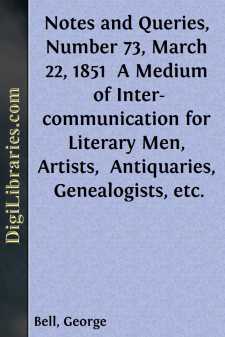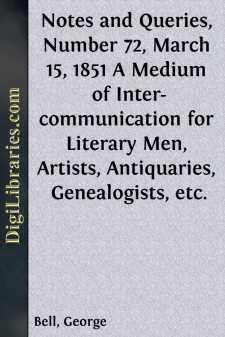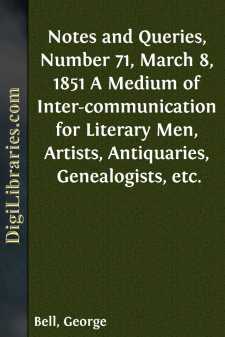Categories
- Antiques & Collectibles 13
- Architecture 36
- Art 48
- Bibles 22
- Biography & Autobiography 813
- Body, Mind & Spirit 142
- Business & Economics 28
- Children's Books 17
- Children's Fiction 14
- Computers 4
- Cooking 94
- Crafts & Hobbies 4
- Drama 346
- Education 46
- Family & Relationships 57
- Fiction 11829
- Games 19
- Gardening 17
- Health & Fitness 34
- History 1377
- House & Home 1
- Humor 147
- Juvenile Fiction 1873
- Juvenile Nonfiction 202
- Language Arts & Disciplines 88
- Law 16
- Literary Collections 686
- Literary Criticism 179
- Mathematics 13
- Medical 41
- Music 40
- Nature 179
- Non-Classifiable 1768
- Performing Arts 7
- Periodicals 1453
- Philosophy 64
- Photography 2
- Poetry 896
- Political Science 203
- Psychology 42
- Reference 154
- Religion 513
- Science 126
- Self-Help 84
- Social Science 81
- Sports & Recreation 34
- Study Aids 3
- Technology & Engineering 59
- Transportation 23
- Travel 463
- True Crime 29
George Bell
The author has not yet completed their profile.
Author's Books:
Sort by:
by:
George Bell
NOTE UPON A PASSAGE IN "MEASURE FOR MEASURE." The Third Act of Measure for Measure opens with Isabella's visit to her brother (Claudio) in the dungeon, where he lies under sentence of death. In accordance with Claudio's earnest entreaty, she has sued for mercy to Angelo, the sanctimonious deputy, and in the course of her allusion to the only terms upon which Angelo is willing to remit...
more...
by:
George Bell
Notes. ILLUSTRATIONS OF CHAUCER, NO. VI. Unless Chaucer had intended to mark with particular exactness the day of the journey to Canterbury, he would not have taken such unusual precautions to protect his text from ignorant or careless transcribers. We find him not only recording the altitudes of the sun, at different hours, in words; but also corroborating those words by associating them with physical...
more...
by:
George Bell
The Arke of Artificial Day. Before proceeding, to point out the indelible marks by which Chaucer has, as it were, stereotyped the true date of the journey to Canterbury, I shall clear away another stumbling-block, still more insurmountable to Tyrwhitt than his first difficulty of the "halfe cours" in Aries, viz. the seeming inconsistency in statements (1.) and (2.) in the following lines of the...
more...
by:
George Bell
ON THE PROPOSED SUGGESTIONS FOR PRESERVING A RECORD OF EXISTING MONUMENTS. The following communications have reached us since the publication of our remarks on the proposed Monumentarium Anglicanum (No. 73. p. 217. et seq.). They serve to show how much interest the subject has excited among those best qualified to judge of the great utility of some well-organised plan for the preservation of a record...
more...
by:
George Bell
LATIN DRINKING SONG BY RICHARD BRAITHWAIT. I have been surprised, from the facility with which the author of "Drunken Barnaby" seems to pour out his Leonine verse, that no other productions of a similar character are known to have issued from his pen. I am not aware that the following drinking song, which may fairly be attributed to him, has ever appeared in print. It was evidently unknown to...
more...
by:
George Bell
To judge of this question fairly, it will be necessary to cite the passage in which it occurs, as it stands in the folio, Act III. Sc. 8., somewhat at large. "Eno. Naught, naught, all naught! I can behold no longer; Th' Antoniad, the Egyptian admiral, With all their sixty, fly, and turn the rudder; To see't, mine eyes are blasted. Enter Scarus. Scar. Gods and goddesses, all the whole...
more...
by:
George Bell
ON PORTRAITS OF DISTINGUISHED ENGLISHMEN. In submitting to you the following brief observations, it is neither my wish nor intention to undervalue or disparage the labours of Horace Walpole, and Granger, and Pennant, and Lodge, and the numerous writers who have followed in their train, and to whom we are so much indebted for their notices of a great variety of original portraits of distinguished...
more...
by:
George Bell
SUGGESTIONS FOR PRESERVING A RECORD OF EXISTING MONUMENTS. When, in the opening Number of the present Volume (p. 14), we called the attention of our readers to the Monumentarium of Exeter Cathedral, we expressed a hope that the good services which Mr. Hewett had thereby rendered to all genealogical, antiquarian, and historical inquirers would be so obvious as to lead a number of labourers into the same...
more...
by:
George Bell
ILLUSTRATIONS OF CHAUCER. (Vol. iii., pp. 131. 133.) I am glad to perceive that some of the correspondents of "Notes and Queries" are turning their attention to the elucidation of Chaucer. The text of our father-poet, having remained as it were in fallow since the time of Tyrwhitt, now presents a rich field for industry; and, in offering free port and entry to all comments and suggestions, to...
more...
by:
George Bell
ON TWO PASSAGES IN "ALL'S WELL THAT ENDS WELL." Among the few passages in Shakspeare upon which little light has been thrown, after all that has been written about them, are the following in Act. IV. Sc. 2. of All's Well that Ends Well, where Bertram is persuading Diana to yield to his desires: "Bert. I pr'ythee, do not strive against my vows: I was compell'd to her; but...
more...


